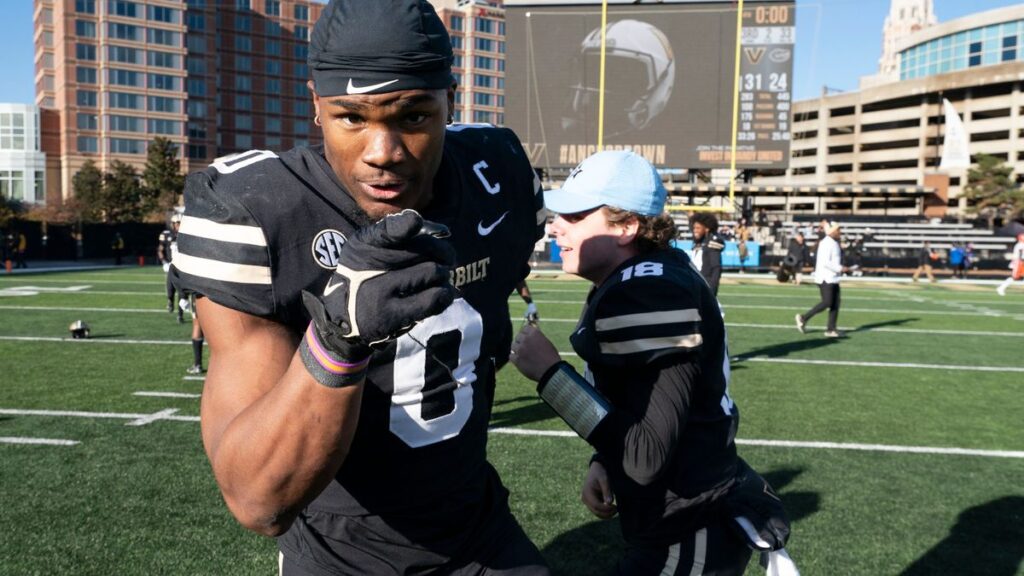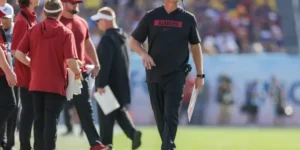
The Tennessee Titans have sparked a wave of emotion among football fans across the state by making a move that’s bound to stir the already passionate SEC fan base. In a transaction that blends professional roster management with college football loyalties, the Titans have signed former Vanderbilt linebacker Anfernee Orji while waiving former Tennessee Volunteers running back Jabari Small. This decision, seemingly routine by NFL standards, carries deeper implications for those embedded in the rich tradition of SEC football and the regional rivalries that shape it.
For Titans fans who double as Tennessee Volunteers loyalists, the release of Jabari Small hits particularly hard. Small, a dependable back during his time in Knoxville, had long been a fan favorite. His gritty playstyle, consistency, and ability to step up in key moments for the Vols earned him a measure of respect that extended beyond Neyland Stadium. Small rushed for over 2,000 yards during his college career and was a core part of Tennessee’s resurgence under head coach Josh Heupel. While he wasn’t the flashiest runner, he brought toughness and a workmanlike approach that mirrored the blue-collar identity of many Titans supporters in the eastern part of the state.
Small’s transition to the NFL was met with quiet optimism. He entered the league undrafted but quickly found a home with the Titans as a potential depth piece in the backfield. For a team known for its physical running style, especially during the Derrick Henry era, Small seemed like a logical fit. But as the Titans shift into a new phase with head coach Brian Callahan steering the offense and a younger quarterback under center in Will Levis, the team appears to be going in a different direction with its backfield.
The decision to waive Small may be strictly football business. After all, NFL rosters are ruthlessly competitive. Still, for the thousands of Vols fans who also root for the Titans, it carries a sting. These are fans who pour their hearts into the orange and white on Saturdays and turn around to cheer for the two-tone blue on Sundays. The connection between the college and pro level is more than geographical—it’s emotional, generational, and cultural. Small’s departure severs a link between those two worlds.
What deepens the emotional contrast is the player being brought in—Anfernee Orji, a standout linebacker from Vanderbilt, the Vols’ in-state SEC rival. Orji, like Small, went undrafted but found opportunities due to his athleticism and intelligence. He initially signed with the New Orleans Saints but was waived and later picked up by the Titans. In some ways, Orji is the type of player fans should be excited about. He’s young, versatile, and hungry. But his Vanderbilt pedigree is sure to rub some fans the wrong way, especially considering the context.
Vanderbilt and Tennessee have one of the most lopsided rivalries in college football, with the Volunteers historically dominating the series. However, that doesn’t mean emotions don’t run high when the two programs meet. Commodore fans revel in the rare upsets, and Tennessee supporters see beating Vanderbilt as a matter of pride and expectation. In recent years, Vanderbilt has been trying to claw its way toward respectability, and players like Orji were key contributors in that mission. During his time in Nashville, Orji developed into one of the SEC’s most productive tacklers, earning All-SEC recognition and becoming a leader on and off the field.
By signing Orji, the Titans are making a bet on potential, not allegiances. But they’ve also reignited an old cultural fault line that runs through Tennessee football. For those in Nashville and surrounding areas who lean toward Vanderbilt, the move might be seen as a small but satisfying victory—proof that Commodore talent can not only compete but thrive at the next level. For many others across the state, especially in Knoxville and eastward, the move will be seen less charitably.
What’s interesting is how these college affiliations continue to influence pro football narratives in states like Tennessee. Unlike places with multiple NFL teams or less centralized college fandom, Tennessee is unique in that it has a single NFL franchise and a dominant college football culture that permeates every corner of the state. That creates a volatile mix of expectations, especially when a move is perceived to favor one school over another.
The Titans, of course, are under no obligation to cater to SEC preferences. They are a professional organization trying to win games, develop talent, and manage a roster under the constraints of the salary cap and positional needs. But in a state where college football colors are worn as proudly as professional team jerseys, every transaction has the potential to stir debate.
Anfernee Orji’s path to the NFL is commendable. A three-year starter at Vanderbilt, he was known for his sideline-to-sideline speed, football IQ, and leadership qualities. His senior season was particularly productive, with over 100 tackles and several key stops against SEC opponents. What set him apart was his ability to play multiple linebacker roles, from coverage to run support. In a league that values versatility, Orji brings a skill set that aligns well with modern defensive schemes.
That’s especially important for the Titans, who are entering a defensive transition of their own. After parting ways with veterans and shuffling the coaching staff, the team is focusing on building around younger, more dynamic defenders. Orji’s arrival is part of that process. It’s less about where he played in college and more about what he can offer now.
Still, that explanation won’t fully appease fans who feel a sense of betrayal over Small’s departure. It’s not that Small was expected to become a Pro Bowler, but he represented something more for Tennessee fans—a symbol of the state’s football pipeline and the pride that comes from seeing former Vols wear Titans colors. It felt like a continuation of a legacy. Losing that connection—even for understandable reasons—leaves a void.
The Titans have made efforts in the past to strengthen their ties to the Volunteers program. Over the years, they’ve drafted or signed former Vols like Justin Hunter, Al Wilson, and recently, Shy Tuttle and Morgan Cox. Those moves helped bridge the gap between Knoxville and Nashville, at least symbolically. But moves like waiving Small in favor of a Vanderbilt product reintroduce old tensions.
In the big picture, this is unlikely to determine the Titans’ fate in the upcoming season. Orji may or may not crack the final 53-man roster, and Small could land on his feet with another franchise or practice squad. The NFL offseason is full of churn, with players constantly moving in and out. But the reactions to this particular decision say more about the emotional landscape of football in Tennessee than about any one player’s future.
There’s also a deeper discussion to be had about the evolution of college-to-pro pathways. Players from traditionally weaker programs like Vanderbilt are increasingly finding opportunities in the NFL, thanks to improved development, better exposure, and more open-minded scouting. Orji is part of a wave of Commodores who have earned their place in the pros, and his success could help further validate the program’s growth.
At the same time, Tennessee’s pipeline remains strong. The Vols have consistently produced NFL talent, and that’s not going to change anytime soon. But as roster spots become harder to come by and every inch of value is scrutinized by front offices, college affiliations become secondary to traits like speed, fit, and durability.
That’s what this moment really underscores—the NFL is a business first. The Titans aren’t trying to play favorites in a college rivalry. They’re trying to field the best team possible with the resources and information available. It just so happens that in this case, that process led them to a Vanderbilt linebacker at the expense of a Tennessee running back. And while that decision may make perfect sense within the walls of the Titans’ facility, it resonates far differently in the hearts of fans who grew up bleeding orange.
This emotional clash also reflects the current identity crisis facing the Titans. After a disappointing 2024 campaign, the team is in the process of retooling. The arrival of a new offensive philosophy, younger personnel, and a shift in locker room leadership means the Titans are moving into a new era. That includes making tough choices—ones that don’t always align with local sentiment.
In some ways, this roster move is symbolic of the broader balancing act the Titans must perform. They are Tennessee’s team, but they don’t exclusively represent any one part of the state. Nashville may be their home, but fans stretch from Memphis to Mountain City. Every decision they make is scrutinized through the lens of regional pride, SEC allegiances, and hometown loyalty.
For Anfernee Orji, the opportunity to join the Titans is a testament to his perseverance and ability. It’s a chance to continue proving people wrong and carving out a role at the highest level. For Jabari Small, it’s a moment of uncertainty, but also a new chapter waiting to unfold. He’s too talented and driven to disappear quietly.
In the meantime, Titans fans are left to grapple with the uncomfortable intersection of college pride and professional pragmatism. They’ll continue to support the team on Sundays, but they’ll do so with the memory of Jabari Small’s contributions fresh in their minds—and perhaps with a wary eye on how many snaps Orji gets in the preseason.
Ultimately, this is football in Tennessee—a sport that transcends fields and franchises, rooted in traditions that die hard. The Titans’ decision may be a footnote in the grand scheme of NFL transactions, but for SEC fans in this football-mad state, it’s the kind of move that keeps the rivalry fires burning year-round.





